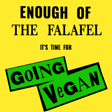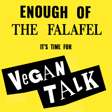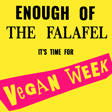
219- Can we measure animals' suffering?
...and if we can, what should we do with that information? In this episode, Shane, Dominic, Julie & Ant examine the work of the Welfare Footprint Institute (https://welfarefootprint.org/) and ask if there is value in quantifying the lived experiences of animals subjected to animal agriculture.
During the episode we refer to this article from Vox too: https://www.vox.com/future-perfect/461815/broiler-chicken-animal-welfare-footprint
As ever, we love hearing your views on the topics under discussion (or anything else!) so do drop us your thoughts via enoughofthefalafel@gmail.com
*************
Enough of the Falafel is a community of people who love keeping on top of the latest news in the world of veganism & animal rights. With the Vegan Talk podcast, we aim to develop listeners' (& our own) thoughts around key issues affecting veganism & the animal rights movement; giving our opinions, whilst staying balanced; remaining true to our vegan ethics, whilst constantly seeking to grow & develop.
Each week we home in on one topic in particular and pick it apart in more detail. If you have a suggestion for a future show, do get in touch via enoughofthefalafel@gmail.com.
*******************
Thanks everyone for listening; give us a rating and drop us a message to say "hi"; it'll make our day!
Julie, Shane, Dominic & Anthony


